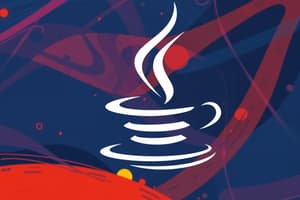Podcast
Questions and Answers
What defines a new abstract data type?
What defines a new abstract data type?
- Method
- Class (correct)
- Instance
- Object
What is an instance of a class data type?
What is an instance of a class data type?
Object
Object-oriented programming is designing a program by discovering objects, their properties, and their ______.
Object-oriented programming is designing a program by discovering objects, their properties, and their ______.
relationships
What holds the data for objects?
What holds the data for objects?
What are the code behaviors or actions that an object can perform?
What are the code behaviors or actions that an object can perform?
What initializes the instance variables when the object is created?
What initializes the instance variables when the object is created?
What is the method that is first called when a Java application executes?
What is the method that is first called when a Java application executes?
What are other names for instance variables?
What are other names for instance variables?
Private means that only the code in this class can directly access the instance variable values.
Private means that only the code in this class can directly access the instance variable values.
What is the term for the data and code acting on the data being wrapped together into a single unit?
What is the term for the data and code acting on the data being wrapped together into a single unit?
Public means that variables can only be accessed from inside the class.
Public means that variables can only be accessed from inside the class.
What is another term for a getter method in Java?
What is another term for a getter method in Java?
What are setters or modifiers in Java commonly referred to as?
What are setters or modifiers in Java commonly referred to as?
Void is a return type used to indicate that the method does return something.
Void is a return type used to indicate that the method does return something.
Flashcards are hidden until you start studying
Study Notes
Java Class Anatomy
- A class serves as a blueprint to define a new abstract data type, encapsulating data and methods.
- An object is an instance of a class, representing an actual entity created based on the class definition.
- Object-oriented programming (OOP) emphasizes design through identifying objects, their attributes, and relationships, promoting code reusability and modularity.
- Instance variables are attributes specific to an object, used to hold its data.
- Methods define actions or behaviors that objects can perform, encapsulating functionality within the class.
- Constructors are special methods invoked when an object is created, responsible for initializing instance variables.
- The main method is the entry point of a Java application, where execution begins.
- Attributes, fields, or properties are alternative terms for instance variables in a class.
- The private access modifier restricts direct access to instance variables, ensuring data encapsulation and security within the class.
- Data encapsulation combines data (instance variables) and methods, hiding implementation details and exposing only necessary interfaces.
- The public access modifier allows methods and variables to be accessed from outside the class, facilitating interaction with the object.
- An accessor method, often referred to as a getter, provides read access to private instance variables.
- A mutator method, also known as a setter, modifies the value of instance variables, controlling how data is updated.
- The term void indicates that a method does not return a value, simplifying the method’s structure.
Studying That Suits You
Use AI to generate personalized quizzes and flashcards to suit your learning preferences.




